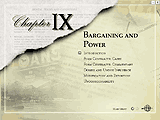Multimedia Contracts Course DVD
First Year Curriculum Includes Innovative Multi-media Contracts Course Delivered Via DVD-ROM
 Imagine learning the contract doctrines of warranty and disclosure
by witnessing a used-car salesman perform his well-rehearsed sales pitch on a first-time car buyer–and then watching that same buyer conferring with her attorney when the car turns out to be
a lemon. Would those legal doctrines seem more alive than if you simply read about them in a textbook? Consider reading a high profile contractual good faith opinion written by Richard
Posner–and then having the famous judge from the Seventh Circuit Court of Appeals explain his reasoning, in person.
Imagine learning the contract doctrines of warranty and disclosure
by witnessing a used-car salesman perform his well-rehearsed sales pitch on a first-time car buyer–and then watching that same buyer conferring with her attorney when the car turns out to be
a lemon. Would those legal doctrines seem more alive than if you simply read about them in a textbook? Consider reading a high profile contractual good faith opinion written by Richard
Posner–and then having the famous judge from the Seventh Circuit Court of Appeals explain his reasoning, in person.
These questions are no longer hypothetical, thanks to The Contracts Experience, an innovative set of multi-media course materials delivered via DVD-ROM that debuted at Duke Law this year. During the spring 2002 semester, over half of the Class of 2005 learned contracts law without using a textbook. Instead, students booted up their laptops and launched The Contracts Experience on their DVD-ROM players. Taking full advantage of the Law School’s technologically advanced classrooms, The Contracts Experience combines text, audio, video, and animation to explore contract law theory and practice with a depth and rigor not possible with a conventional textbook.
“The Contracts Experience engages students in a way that conventional methods do not,” observed Duke Law Professor JohnWeistart, leader of the team that created the first-of-its-kind technology initiative. “In most law school classrooms, students are taught critical legal skills by one professor using one textbook and one blackboard. Using the Law School’s IT infrastructure and new DVD-ROM technology, this project expands the reach of the traditional classroom, offering new voices and perspectives via video and audio."
To create The Contracts Experience, Weistart led a team of two law professors, Duke Law School's H. Jefferson Powell and Georgetown University Law Center's Girardeau A. Spann, and two producer/editors, Christopher B. McLaughlin, ’96 and Denise E. Thorpe, ’91. The project involved filming over sixty hours of interviews with scholars, judges and lawyers in six different cities, plus another twenty days of filming hypotheticals and case reenactments. In addition to its emphasis on video, TCE provides students with immediate hyperlinked access to digital, full-text versions of the Uniform Commercial Code ("UCC") and the Restatement (2d) of Contracts, as well as other research sources.
"First-year law students consistently underutilize these important legal resources," said Richard A. Danner, Duke Law's Senior Associate Dean for Information Technology. "Unlike traditional textbooks, The Contracts Experience makes it remarkably simple for professors to incorporate the UCC and Restatement into the first-year curriculum, helping expose students early on to the legal tools they will rely on throughout their careers."
Over 250 first-year law students used the course materials this past spring, in two classes at Duke Law and one at Georgetown. Although not all of them were as emphatic as one anonymous reviewer who exclaimed “The DVD rocked!,” the students generally applauded the integration of multi-media into the classroom and their homework, and were quick to adapt to the creative pedagogy.
“Doing homework with the DVD was almost a pleasure,” said Patricia Festin ‘05. “The combination of text and video helped me get my hands around concepts more quickly than I normally do with a regular casebook. The video hypotheticals and reenactments were both entertaining and substantive, and they forced me to think longer and harder about the application of the law than I did when reading only a written opinion.”
The cutting-edge DVD-ROM is already garnering national accolades from industry groups. Three video industry competitions recently selected The Contracts Experience for special recognition in the education and multi-media categories. The product took home honors in the Aegis Awards, the Videographer Awards, and the Telly Awards, three national competitions judged by video professionals and recognizing excellence in video writing, editing, and production.
“We couldn’t be more pleased with these awards, which we think are attributable to our commitment to high production values throughout the development process,” says Weistart. “From the beginning, we realized that the video had to be extremely professional to accomplish our pedagogical goals.”
Weistart and his team envision a series of products, all based on the concept of seamless integration between multi-media and traditional legal education tools, and hope to encourage professors at other law schools to experiment with the new technology. "We intentionally created a very flexible and versatile platform for the project, one that can be easily adapted for a broad array of classroom-based or distance learning courses,” he noted.
Likely candidates for future video-based course materials include professional responsibility and ethics, and intellectual property law, two fields of emphasis at the Law School that are ripe for
exploration with multi-media.
To learn more about the Law School’s instructional technology initiatives, please contact Chris McLaughlin at mclaughlin@law.duke.edu.